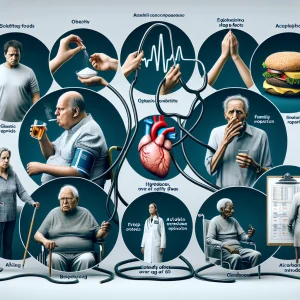Understanding High Blood Pressure: The Silent Killer and Its Risks
High blood pressure, known medically as hypertension, is a widespread health issue significantly impacting adults worldwide. Many people may unknowingly coexist with high blood pressure, as it often lacks overt symptoms. This invisible threat can lead to dire consequences, as untreated hypertension is a major contributor to serious health conditions such as heart disease and stroke. Therefore, regular screenings for hypertension are essential to monitor your blood pressure levels and ensure they remain within a safe and healthy range, preventing long-term health complications and promoting a better quality of life.
Implementing minor yet impactful lifestyle changes can substantially enhance your ability to manage blood pressure effectively. Simple modifications, like incorporating a nutritious diet rich in fresh fruits, vegetables, and whole grains, alongside ensuring adequate sleep, can significantly influence blood pressure regulation. These lifestyle alterations not only foster improved cardiovascular health but also contribute to overall well-being, enhancing energy levels and mood while reducing the risk of chronic health conditions associated with hypertension.
 The Importance of Blood Pressure: Measurement and Implications
The Importance of Blood Pressure: Measurement and Implications
Blood pressure refers to the force exerted by the flow of blood against the walls of your blood vessels, predominantly influenced by the heart’s pumping mechanism. This critical measure serves as an indicator of how effectively blood circulates throughout the body and the resistance it encounters in the arteries. Maintaining optimal blood pressure levels is vital for overall health, as high readings can have severe repercussions, including damage to vital organs and increased risk of stroke or heart attack.
Blood pressure is measured in millimeters of mercury (mmHg) and consists of two primary components:
- Systolic Pressure – This is the first number in a reading, indicating the pressure in the arteries when the heart beats and pumps blood.
- Diastolic Pressure – This second number represents the pressure in the arteries when the heart is at rest between beats.
For example, a blood pressure reading of 120/80 mmHg denotes a systolic pressure of 120 and a diastolic pressure of 80, which is generally considered a normal and healthy range.
Understanding High Blood Pressure: Causes and Associated Risks
High blood pressure can develop from a myriad of factors, predominantly linked to the narrowing of arteries that heighten resistance to blood flow. This increased resistance can lead to elevated blood pressure levels, placing excessive strain on critical organs such as the kidneys, heart, brain, and eyes. Over time, uncontrolled hypertension can result in severe health complications, particularly related to cardiovascular diseases that can drastically affect quality of life.
Although blood pressure can fluctuate for various reasons, healthcare professionals classify readings based on established standards:
Low blood pressure – 90/60 mmHg or lower
Normal blood pressure – Ranges from 90/60 mmHg to 120/80 mmHg
High blood pressure – 140/90 mmHg or higher
A reading between 120/80 mmHg and 140/90 mmHg indicates a potential risk for developing hypertension in the future. However, it is crucial to understand that blood pressure norms can differ among individuals, making it essential to consult with your healthcare provider for personalized advice and monitoring.
 Exploring the Key Causes of High Blood Pressure
Exploring the Key Causes of High Blood Pressure
While there is no singular cause of high blood pressure, numerous risk factors can contribute to its onset. Significant causes include:
- Being overweight or obese
- Smoking
- High-sodium diet
- Family history of hypertension
- Excessive alcohol intake
- Poor sleep habits
- Lack of physical activity
- Aging, particularly after 65
- Ethnic background, especially among Caribbean or African descent
Many of these risk factors can be modified through conscious lifestyle changes. In rare cases, high blood pressure may stem from underlying medical conditions or specific medications, affecting approximately 1 in 20 individuals. These conditions may include:
- Thyroid disorders
- Kidney diseases
- Diabetes
- Corticosteroid use
- Hormonal contraceptives
- Recreational drugs like cocaine
Unveiling the Hidden Symptoms of High Blood Pressure
One of the significant challenges with hypertension is its tendency to present without noticeable symptoms, causing many individuals to remain unaware of their condition. In the UK alone, around 25% of adults are estimated to live with undiagnosed high blood pressure. The only reliable method to ascertain your blood pressure status is through regular testing and monitoring.
You can measure your blood pressure at various convenient locations, including:
- Your GP’s office or other healthcare facilities—simply request a blood pressure measurement.
- Local pharmacies, which often provide blood pressure checks.
- Certain workplaces that offer health screenings for employees.
- At home, using a personal blood pressure monitor to keep track of your readings.
 Proven Strategies for Effectively Lowering Your Blood Pressure
Proven Strategies for Effectively Lowering Your Blood Pressure
Considering the significant impact of lifestyle factors on high blood pressure, adopting effective changes is crucial for reducing risk. Here are four essential strategies you can implement:
Incorporate Regular Physical Activity into Your Routine
Integrating consistent exercise into your daily life is essential for maintaining your heart and blood vessel health, which in turn aids in lowering blood pressure levels. Carrying excess weight puts additional strain on your heart, forcing it to work harder to circulate blood. By engaging in regular physical activity, you can shed pounds and enhance your cardiovascular fitness, both of which are highly beneficial for lowering blood pressure and promoting heart health.
Embrace a Heart-Healthy Diet
Focusing on a well-balanced diet that prioritizes whole foods, including ample fruits, vegetables, and lean proteins, can profoundly impact your blood pressure. Since high sodium intake is linked to elevated blood pressure, it’s essential to reduce your salt consumption. The NHS recommends limiting daily salt intake to under 6g, equivalent to roughly one teaspoon. Consider minimizing the intake of processed foods that are often high in salt and use herbs and spices to enhance the flavor of your meals instead.
Moderate Your Alcohol Consumption
Limiting both the amount and frequency of alcohol consumption is vital for managing blood pressure effectively. Incorporating alcohol-free days into your week and spacing out drinking occasions can provide significant benefits. Although the NHS suggests a maximum of 14 units of alcohol per week—approximately 7 pints of 4% beer or 7 glasses of 175ml wine—it’s not necessary to consistently reach this limit to maintain good health.
Ensure Adequate Sleep for Optimal Health
Chronic sleep deprivation can significantly heighten the risk of developing high blood pressure. The NHS recommends aiming for 6 to 9 hours of quality sleep each night to support overall health and maintain balanced blood pressure levels. Establishing a relaxing bedtime routine and creating a sleep-friendly environment can greatly contribute to improved sleep quality, ultimately benefiting your cardiovascular health.
Presented By: Private Blood Pressure Tests
The Article Blood Pressure Test Explained: What You Need to Know Was Found On https://limitsofstrategy.com





Comments are closed